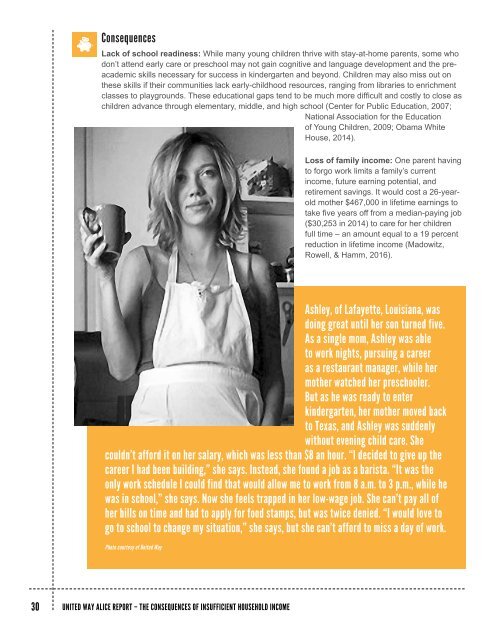The Consequences of Insufficient Household Income
This new Consequences of Insufficient Household Income report provides a deeper level of understanding of the choices that ALICE and poverty-level families across the country make when they do not have enough income or assistance to afford basic necessities, and the consequences of those choices.
This new Consequences of Insufficient Household Income report provides a deeper level of understanding of the choices that ALICE and poverty-level families across the country make when they do not have enough income or assistance to afford basic necessities, and the consequences of those choices.
You also want an ePaper? Increase the reach of your titles
YUMPU automatically turns print PDFs into web optimized ePapers that Google loves.
<strong>Consequences</strong><br />
Lack <strong>of</strong> school readiness: While many young children thrive with stay-at-home parents, some who<br />
don’t attend early care or preschool may not gain cognitive and language development and the preacademic<br />
skills necessary for success in kindergarten and beyond. Children may also miss out on<br />
these skills if their communities lack early-childhood resources, ranging from libraries to enrichment<br />
classes to playgrounds. <strong>The</strong>se educational gaps tend to be much more difficult and costly to close as<br />
children advance through elementary, middle, and high school (Center for Public Education, 2007;<br />
National Association for the Education<br />
<strong>of</strong> Young Children, 2009; Obama White<br />
House, 2014).<br />
Loss <strong>of</strong> family income: One parent having<br />
to forgo work limits a family’s current<br />
income, future earning potential, and<br />
retirement savings. It would cost a 26-yearold<br />
mother $467,000 in lifetime earnings to<br />
take five years <strong>of</strong>f from a median-paying job<br />
($30,253 in 2014) to care for her children<br />
full time – an amount equal to a 19 percent<br />
reduction in lifetime income (Madowitz,<br />
Rowell, & Hamm, 2016).<br />
Ashley, <strong>of</strong> Lafayette, Louisiana, was<br />
doing great until her son turned five.<br />
As a single mom, Ashley was able<br />
to work nights, pursuing a career<br />
as a restaurant manager, while her<br />
mother watched her preschooler.<br />
But as he was ready to enter<br />
kindergarten, her mother moved back<br />
to Texas, and Ashley was suddenly<br />
without evening child care. She<br />
couldn’t afford it on her salary, which was less than $8 an hour. “I decided to give up the<br />
career I had been building,” she says. Instead, she found a job as a barista. “It was the<br />
only work schedule I could find that would allow me to work from 8 a.m. to 3 p.m., while he<br />
was in school,” she says. Now she feels trapped in her low-wage job. She can’t pay all <strong>of</strong><br />
her bills on time and had to apply for food stamps, but was twice denied. “I would love to<br />
go to school to change my situation,” she says, but she can’t afford to miss a day <strong>of</strong> work.<br />
Photo courtesy <strong>of</strong> United Way<br />
30 UNITED WAY ALICE REPORT – THE CONSEQUENCES OF INSUFFICIENT HOUSEHOLD INCOME




